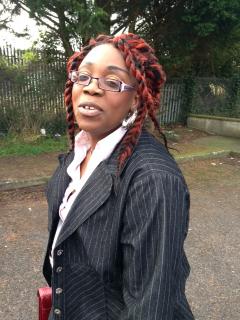Black woman lawyer alleges she was subjected to discriminatory remarks by tribunal chairman

Ashimedua Okonkwo
A solicitor has alleged that she was subjected to discriminatory remarks in tribunal proceedings because she is “a woman and a black African”.
Ashimedua Okonkwo, who was admitted to practice as a solicitor in Ireland in 2013 and holds a master’s degree from TCD School of Law, told the High Court that the alleged incident took place while she attempted to represent a client during mental health tribunal proceedings.
The Mental Health Commission tribunal was considering the continued detention under the Mental Health Act of a woman, who cannot be identified for legal reasons, as an involuntary patient at a hospital.
Lawyers for the woman have claimed that she and her family’s desire to be represented at the tribunal by Ms Okoknwo was refused by the tribunal’s chairman.
The patient subsequently left the room and proceedings continued in her absence. The tribunal eventually concluded that the woman’s detention should continue for another six months.
Lawyers for the woman now claim that the way in which the tribunal was conducted, particularly the remarks allegedly made to Ms Okonkwo, render the woman’s detention unlawful.
The case came before the High Court on Friday when Ms Justice Caroline Costello directed an inquiry under Article 40 of the Constitution into the legality of the woman’s detention.
In a sworn statement, Ms Okonkwo, based in Balbriggan, Co Dublin, said she was contacted by the woman’s family in September and agreed to represent her, replacing a solicitor previously assigned by the Mental Health Commission.
Ms Okonkwo said she made arrangements with and collected her client’s file from the other solicitor and formally notified the Commission that she was now representing the woman.
She said that she attended the tribunal last week to review the woman’s case and informed the chairman Eamonn Walsh BL that she was representing the woman.
She claims the chairman said the woman did not have the right to choose her own legal representative and that the tribunal had a right to do what it appeared to be reasonable and just.
Ms Okonkwo said she was asked by Mr Walsh if she was qualified to practice in Ireland, and if she knew about the Mental Health Acts, and that those solicitors engaged by the Commission to act for patients were “very highly trained” in the Mental Health Act.
She said she found his remarks “disturbing … [and] I considered his remarks to be discriminatory given I am a woman and a black African”. She wondered if Mr Walsh “questioned all legal representatives appearing before a tribunal” as to their standing in this jurisdiction.
Ms Okonkwo highlighted her credentials and pointed out that she is about to receive a doctorate in law from TCD School of Law.
After the previous solicitor was imposed on the woman as her legal representative, Ms Okonkwo protested on behalf of her client.
She claims she was asked to be quiet and was permitted to sit at the back of the room where the tribunal was being conducted but was not allowed to speak, take notes or make a recording.
Aodhan O Faolain, Ireland International News Agency Ltd.






